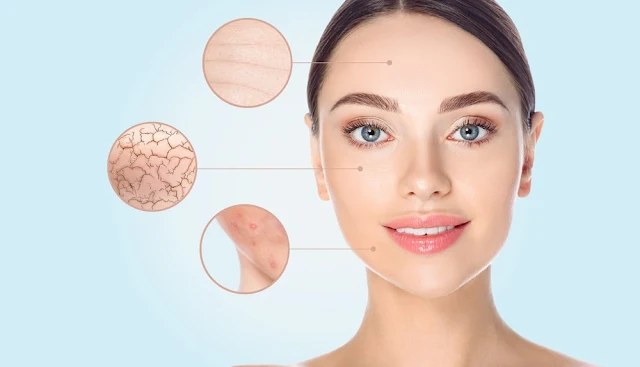Skin dehydration can make your skin look rough, itchy, flaky or scaly. The location of these dry patches varies from person to person. It is a common condition that affects people of all ages.
There are many things you can do to improve the health of your skin, including moisturizing it. To that end, we're going to share with you some expert tips on how to moisturize your skin quickly and properly.
Skin dehydration symptoms
A person is 60–90% water, and the skin makes up 64% of that. Hyaluronic acid, which is produced independently in the human body, retains moisture in the tissues. In combination with other substances (collagen and elastin), it forms the so-called extracellular matrix. This is a dense, gelatinous substance that creates a framework for the epidermis.
During the aging process, the body begins to produce less and less of these elements. A significant decrease is already observed after the age of 25. The skin loses its tone and the first wrinkles appear. In addition to the natural causes of withering, unfavorable environmental factors can cause even greater loss of moisture.
Dehydrated skin is characterized by flaking, irritation, and fine lines. The face looks tired and worn. To the touch, one can feel irregularities and a loss of elasticity. Dehydration is not only recognizable on the outside. It can also be felt from the inside. It is urgent to take measures to deeply moisturize the skin of the face.
Causes of skin dehydration
Dry skin is often confused with dehydrated skin. In both phenomena, it lacks moisture. But they are different conditions that require different procedures. The reasons for their appearance are as follows:
- Dry skin This is an individual characteristic of the organism. It occurs as a result of a violation of the barrier properties. The epidermis lacks moisture and lipids, which is why it dries out. Since this is a genetic characteristic, there is nothing you can do about it. All you need to do is provide the necessary care to maintain beauty and health.
- Dehydrated skin In this case, too, there is insufficient hydration. This is due to a change in the complex of organic and inorganic components that fill the space between the cells. This condition can occur on any type of skin. It is not hereditary, so the problem can be eliminated.
The degree of hydration depends on the hydrolipidic barrier. This barrier protects the skin from external aggression. When its function is disturbed, it begins to absorb less moisture. This is called a lipid imbalance. This can happen for a variety of reasons, such as a habitual predisposition or inappropriate skin care. The skin loses its attractive appearance, becomes flabby, and wrinkles appear on it.
In addition, the following factors can trigger the risk of skin dehydration:
- Hereditary;
- A lack of sleep quality;
- An irrational diet and a lack of moisture in the body;
- Lack of vitamins;
- Renal and hepatic pathology;
- Disorders of the hormone system;
- Age;
- Harmful external phenomena (frost, wind, sun).
Another reason why the epidermis loses a large amount of moisture is inadequate care. Aggressive skin care products, excessive cleansing, poor quality cosmetics: all of these have a detrimental effect on the skin, breaking down the lipid barrier. It is therefore extremely important to know what moisturizes the skin of the face well but does not harm it.
A simple lifestyle to prevent skin dehydration
This factor has a strong influence on the hydration of the epidermis, so the following rules should be followed:
To avoid skin dehydration, you should consume plenty of fluids every day. An adult should drink at least 1.5 to 2 liters of water per day.
Get at least 7 hours of sleep per day. Scientific evidence shows that lack of sleep and high stress have a negative effect on the amount of moisture in the cells. During a night's rest, the skin regenerates, and lack of sleep leads to a decrease in hormone levels that stimulate cell synthesis and promote elasticity.
Give up bad habits. Alcoholic beverages dehydrate and eliminate the vitamins necessary for the normal synthesis of hyaluronic acid, collagen, and elastin. Nicotine changes the skin's complexion, making it lifeless.
Eat a balanced diet. Foods provide the vitamins and minerals needed for normal body function. It is best to give up fast food, smoked meats, and other unhealthy foods and include more fruits, vegetables, and herbs in your diet. They contain many antioxidants and moisture, which is necessary for the skin. You should also eat foods that contain coarse fiber. They are present in large quantities in cauliflower, eggs, spinach, tomatoes, and potatoes. Fiber retains moisture well.
General rules to protect your skin
In order not to violate the protective barrier of the skin because of which it will lose moisture, you should follow the basic requirements of skin care measures:
- Cleanse the skin daily, even if no cosmetics have been used. During the day, dirt and dust accumulate on the surface, which becomes a favorable environment for the reproduction of pathogenic microflora. We recommend that you choose special products for cleaning, to be done with care so as not to damage the epidermis.
- Use only lukewarm water for washing. You can't wash with ordinary soap.
- To keep the moisture, make sure you use the cream twice a day. When applying it, you need to make light tapping motions. If decorative cosmetics are used, it is best to choose the appropriate products. In the evening, apply them immediately after washing but 30 minutes before bedtime.
If you adhere to these rules, the risk of skin dehydration will be reduced.
How to moisturize your skin
You can take care of the skin integument both at the cosmetology salon and at home by yourself. So, keep your skin moisturized with proper care and special care, including:
Using a gentle cleanser, not scrubbing too hard, and washing with warm water.
Scrubbing with a harsh cleanser or washing with hot water will remove moisture and oil from your skin. Lather up with a cleanser that's appropriate for your skin type and wash by rolling the lather over your skin.
Rinse with warm water to retain the essential oils.
Use a moisturizing lotion.
After washing your face, apply a moisturizer as soon as possible. It's also important to use lotions with strong moisturizing properties, including hyaluronic acid, collagen, and ceramide. By supporting the skin's water-holding capacity, it becomes easier to increase the amount of moisture.
Use the cotton ball technique.
Stretch the lotion-soaked cotton ball over your entire cheek. Do the same on your forehead, chin, and around your nose, and wait 5 minutes. You can expect the lotion to penetrate the skin and increase its water retention.
Apply oil with a lotion or milky cream.
After replenishing moisture with lotion, replenish the oil with a milky lotion or cream. Milky lotions and creams support the role of sebum, making it difficult for the skin to lose moisture. Apply the lotion all over your face and the cream only to dry areas. If you apply the cream to areas with high sebum secretion, it will be sticky.
You can use the organic oil of your choice. However, because of its nourishing properties for the skin, we strongly recommend Moroccan argan oil.
Ingredients that help minimize skin dehydration
Use moisturizing cosmetics that contain the following ingredients. They are supposed to increase the amount of moisture in your skin:
Ceramide
Ceramide is a component called intercellular lipid that exists to fill the spaces between the cells of the stratum corneum. It plays a role in retaining moisture in the cells of the stratum corneum. It is important to supplement it with cosmetics because it is lost due to friction and dryness.
Collagen
Collagen is a component contained in the dermis. It's located deep in the skin, and has the function of maintaining the firmness and elasticity of the skin. Aging and UV rays cause collagen loss, so it's important to supplement it with cosmetics.
Hyaluronic acid
Hyaluronic acid is an ingredient that retains water in small quantities. It is a component that originally exists in the skin. On the other hand, aging, dry air, ultraviolet rays, and friction all cause hyaluronic acid loss. As a result, it is necessary to reconstitute it with cosmetics.
Finally, we recommend that you follow these rules to maintain a water balance.
- Every day, drink 1.5 to 2 liters of water.
- Protect the skin from direct sunlight to prevent moisture loss.
- Eat more vegetables and fruits.
- Sleep at least 7 to 8 hours per day;
- Be outdoors more often; do sports to supply the cells with oxygen and moisture.











